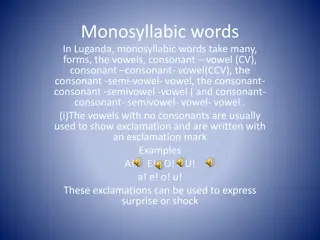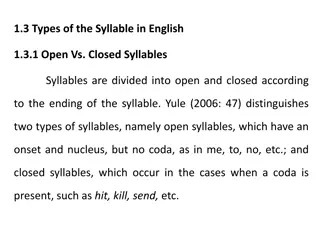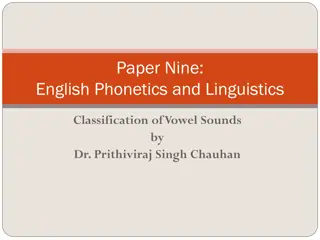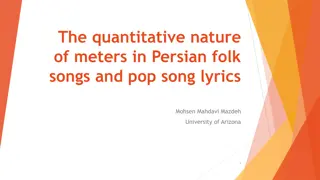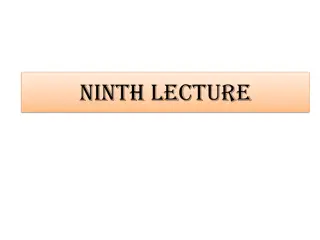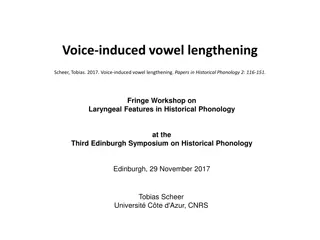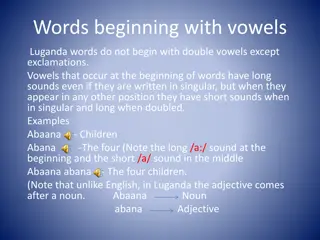The Great Vowel Shift: A Linguistic Evolution
The Great Vowel Shift was a significant phonological transformation in the English language during the 15th to 17th centuries that altered the pronunciation of long vowel sounds. This shift, marked by a movement of vowel sounds to higher and more forward positions in the mouth, shaped the transition from Middle English to Modern English. The changes in pronunciation during this period were notable and rapidly transformed the linguistic landscape of English.
Download Presentation

Please find below an Image/Link to download the presentation.
The content on the website is provided AS IS for your information and personal use only. It may not be sold, licensed, or shared on other websites without obtaining consent from the author. Download presentation by click this link. If you encounter any issues during the download, it is possible that the publisher has removed the file from their server.
E N D
Presentation Transcript
Great Vowel Great Vowel Shift Shift
A major factor separating Middle English from Modern English is known as the Great Vowel Shift, a radical change in pronunciation during the 15th, 16thand 17thcc., as a result of which long vowel sounds began to be made higher and further forward in the mouth (short vowel sounds were largely unchanged). In fact, the shift probably started very gradually some centuries before 1400, and continued long after 1700 (some subtle changes arguably continue even to this day). Many languages have undergone vowel shifts, but the major changes of the English vowel shift occurred within the relatively short space of a century or two, quite a sudden and dramatic shift in linguistic terms. It was largely during this short period of time that English lost the purer vowel sounds of most European languages, as well as the phonetic pairing between long and short vowel sounds.
Middle English time /ti:m/ green /gre:n/ break /bre:k/ name /na:m / day /dai/ loud /lu:d/ boot /bo:t/ boat /bo:t/ law /lau/ Modern English /taim/ /gri:n/ /breIk/ /neim/ /dei/ /laud/ /bu:t/ /bout/ /lo:/
fif . . . . . . . . .(pronounced feef) . . . . . . . . . . . . . . . .five mede . . . . . . .(pronounced maid eh ) . . . . . . . . . . .meed breke . . . . . . .(pronounced bray keh ) . . . . . . . . . . .break name . . . . . . .(pronounced nahm eh ) . . . . . . . . . . .name goot . . . . . . . .(pronounced gawt ) . . . . . . . . . . . . . . . .goat roote . . . . . . .(pronounced row teh ) . . . . . . . . . . . .root mus . . . . . . . .(pronounced moose ) . . . . . . . . . . . . . .mouse
In Middle English (for instance in the time of Chaucer), the long vowels were generally pronounced very much like the Latin-derived Romance languages of Europe (e.g. sheep would have been pronounced more like shape ; me as may ; mine as meen ; shire as sheer ; mate as maat ; out as oot ; house as hoose ; flour as floor ; boot as boat ;mode as mood ; etc). William the Conqueror s Domesday Book , for example, would have been pronounced doomsday , as indeed it is often erroneously spelled today. After the Great Vowel Shift, the pronunciations of these and similar words would have been much more like they are spoken today. The Shift comprises a series of connected changes, with changes in one vowel pushing another to change in order to "keep its distance", although there is some dispute as to the order of these movements. The changes also proceeded at different times and speeds in different parts of the country.
Thus, Chaucers word lyf (pronounced leef) became the modern word life, and the word five (originally pronounced feef ) gradually acquired its modern pronunciation. Some of the changes occurred in stages: although lyf was spelled life by the time of Shakespeare in the late 16thc., it would have been pronounced more like lafe at that time, and only later did it acquired its modern pronunciation. It should be noted, though, that the tendency of upper- classes of southern England to pronounce a broad a in words like dance, bath and castle (to sound like dahnce , bahth and cahstle ) The Great Vowel Shift was merely an 18thc. fashionable affectation which happened to stick, and nothing to do with a general shifting in vowel pronunciation.
The Great Vowel Shift gave rise to many of the oddities of English pronunciation, and now obscures the relationships between many English words and their foreign counterparts. The spellings of some words changed to reflect the change in pronunciation stone from stan, rope from rap, dark from derk, barn from bern, heart from herte, etc but most did not. In some cases, two separate forms with different meaning continued parson, which is the old pronunciation ofperson The effects of the vowel shift generally occurred earlier, and were more pronounced, in the south, and some northern words like uncouth and dour still retain their pre-vowel shift pronunciation ( uncooth and door rather than uncowth and dowr ).
Many other consonants ceased to be pronounced at all the final b in words like dumb and comb; the l between some vowels and consonants such as half, walk, talk and folk; the initial k or g in words like knee, knight, gnaw and gnat; etc As late as the 18thc., the r after a vowel gradually lost its force, although the r before a vowel remained unchanged render, terror, etc unlike in American usage where the r is fully pronounced.
So, while modern English speakers can read Chaucers Middle English (with some difficulty admittedly), Chaucer s pronunciation would have been almost completely unintelligible to the modern ear. The English of William Shakespeare and his contemporaries in the late 16thand early 17thcc., on the other hand, would be accented, but quite understandable, and it has much more in common with our language today than it does with the language of Chaucer. Even in Shakespeare s time, though, and probably for quite some time afterwards, short vowels were almost interchangeable (e.g. not was often pronounced, and even written, as nat, when as whan, etc, and the pronunciation of words like boiled as byled , join as jine , poison as pison , merchant as marchant , certain as sartin , person as parson , heard as hard , speak as spake , work as wark , etc,
continued well into the 19thc. We retain even today the old pronunciations of a few words like derby and clerk (as darby and clark ), and place names like Berkeley and Berkshire (as Barkley and Barkshire ), except inAmerica where more phonetic pronunciations were adopted.
Busy has kept its old West Midlands spelling, but an East Midlands/London pronunciation; bury has a West Midlands spelling but a Kentish pronunciation It is also due to irregularities and regional variations in the vowel shift that we have ended up with inconsistencies in pronunciation such as food (as compared to good, stood, blood, etc) and roof (which still has variable pronunciation), and the different pronunciations of the o in shove, move, hove, etc. The Old English consonant X - technically a voiceless velar fricative , pronounced as in the ch of loch or Bach - disappeared from English, and the OE word burX (place), for example, was replaced with -burgh , -borough , -brough or -bury in many place names. In some cases, voiceless fricatives began to be pronounced like an f (e.g. laugh, cough).







